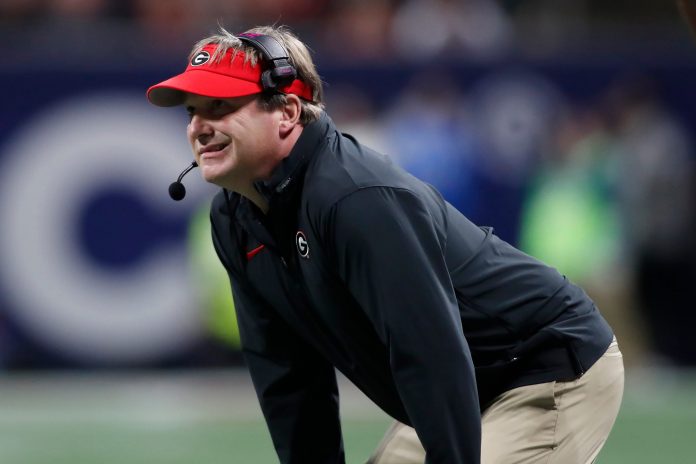Helmet communications between coach and quarterback are finally coming to college football. With that has come a flurry of thoughts about the reasoning and timing of the announcement. But according to Georgia head coach Kirby Smart, it has nothing to do with Michigan’s sign-stealing scandal.
Kirby Smart: Michigan’s Sign-Stealing Wasn’t Primary Reason for In-Helmet Communication
While Michigan was clearly the best team during last year’s National Championship run, the team was mired in controversy. Ex-staffer Connor Stalions was at the center of the NCAA’s sign-stealing investigation after it was found that he had allegedly pre-scouted the Wolverines’ opponents to give the coaching staff the offensive signals for their upcoming opponents.
While then-head coach Jim Harbaugh was suspended for the incident, the discourse around the scandal quickly moved toward a larger question of why college teams still use physical signs instead of helmet communications like the NFL has used for the last 30 years.
However, college football is rapidly implementing new helmet communication rules after quietly trialing the idea during bowl season.
As the co-chair of the rules committee, Smart explained the reasoning behind the changes and made sure to point out that it wasn’t primarily because of Stalions.
“That’s not what the sole intent was,” Smart said, speaking of sign-stealing, according to ESPN.
“I’ve been on the rules committee now three to four years, and coach-to-player communication has come up every single year. It’s been talked about … A lot of coaches debate, talk about how this is not going to stop people from signaling, or having the big cardboard signs on the sideline.”
Smart also said the primary goal “is to get a little closer to what the NFL has done to allow communication.”
KEEP READING: Top 10 Highest-Paid College Football Head Coaches
The proposal will allow teams to have one designated player with communication to the sidelines that will cut off with 15 seconds left on the play clock. Those are similar to the current rules outlined in the NFL.
The helmet communication rules will likely get tweaked in the future, but in-game communication between coaches and players is here to stay.
Miss any action from the top college QB Rankings during the 2023 football season? Want to track all the movement with the college football transfer portal? College Football Network has you covered with that and more!


